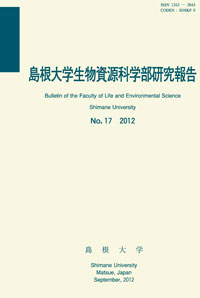島根大学生物資源科学部
ISSN:2435-0885(online)
ISSN:1343-3644(in print)
A publication of this bulletin in print format has not been made since no 24.
ISSN:1343-3644(in print)
A publication of this bulletin in print format has not been made since no 24.

number of downloads : ?
Use this link to cite this item : https://ir.lib.shimane-u.ac.jp/7062
Bulletin of the Faculty of Life and Environmental Science Shimane University 15
2010-09-30 発行
Effect of the light and darkness cycle on eating and rumination behaviour in sheep fed on roughage diet alone
File
Description
In the present study, effect of the changes in daily light(L)and darkness(D)cycle on rumination behaviour in sheep fed roughage alone at a level of2.0or 2.2% dry matter per bodyweight per day in2times feeding a day or hourly feeding. The 4daily lighting treatments were as follows; Treatment I,12L+12D; Treatment II,6L+6D +6L+6D; Treatment III,24L, and Treatment IV,24D in trial1, and in trial2, Treatment I,12D+12L; Treatment II,6D+6L+6D+6L; Treatment III,24D and Treatment IV,24L. During the sampling period in each lighting treatment, the time spent chewing during eating and ruminating was recorded. The eating behaviour was observed in each hour during lighting period in2times feeding a day. Daily eating pattern after hourly feeding was relatively steady in all the4lighting treatments. Daily total time spent ruminating tended to increase in Treatments I and II in2times feeding a day, and in hourly feeding the tendency was in opposition. There was no rumination at1hour after morning and evening feeding in2times feeding a day. In hourly feeding, on the contrary, there was no zero time spent ruminating per hour in all the lighting treatments. During continuous lighting, the rumination pattern in the first half(09:00−21:00)and the latter half(21:00−09:00)was very similar after2times feeding a day, and that after hourly feeding was relatively steady for24hours. From these findings, it was confirmed in ruminant animals that the changes in daily lighting condition, in particular daily darkness pattern, could have clearly influenced on initiation of rumination behaviour.
About This Article
Other Article
PP. 11 - 13
PP. 15 - 18
